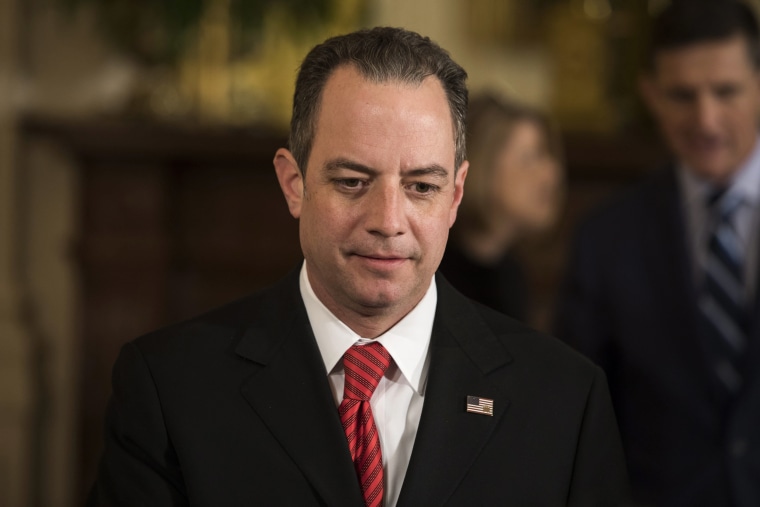White House Chief of Staff Reince Priebus muddied the waters on President Donald Trump’s new executive order barring immigration from select countries, saying Sunday it “doesn’t include green card holders going forward” but adding that anyone traveling back and forth from the countries in question will be subject to further screening, including U.S. citizens.
In an interview on NBC’s “Meet the Press,” Priebus was asked about reports that the executive order affected green card holders, contrary to recommendations from the Department of Homeland Security.
“We didn’t overrule the Department of Homeland Security, as far as green card holders moving forward, it doesn't affect them,” Priebus first said. But when pressed by host Chuck Todd on whether it impacts green card holders, Priebus reversed himself, saying, “Well, of course it does. If you’re traveling back and forth, you’re going to be subjected to further screening.”
Related: Trump Immigration Ban Still In Place Despite Court Ruling, Says DHS
Asked whether the executive order would affect U.S. citizens, he again indicated it would, suggesting it was up to the “discretionary authority” of a Customs and Border Patrol agent whether to question citizens coming from the countries in question.
“I would suspect that if you're an American citizen traveling back and forth to Libya you’re likely to be subjected to further questioning when you come into an airport,” he said. He also suggested the executive order could come to encompass more than the current seven countries included in the ban, and that the order focused on people coming from Iraq, Syria, Iran, Libya, Somalia, Sudan and Yemen because those were identified by Congress as “being the seven most-watched countries in regard to harboring terrorists.”
“Perhaps other countries needed to be added to an executive order going forward — but in order to do this in a way that was expeditious, in a way that would pass muster quickly, we used the 7 countries” already identified by Congress, he said.
Priebus added that the order was rolled out quickly because “this is all done for the protection of Americans, and waiting another three days, waiting another three weeks is something that we don't want to get wrong.”
“President Trump is not willing to get this wrong which is why he wants to move forward quickly and protect Americans,” Priebus added.
A federal judge issued an emergency stay on parts of the executive order Saturday evening, but the DHS and the White House responded early Sunday, saying that the order continues to remain in force.
Priebus also doubled down on the White House’s controversial decision not to reference Jews specifically in their statement on International Holocaust Remembrance Day, saying while he understands the significance of the day, “I don’t regret the words.”
“I recognize, in fact, obviously that that was what the Holocaust was about,” Priebus said when pressed on the fact the Holocaust was a genocide of millions of Jews. “It's a horrible event. And obviously a miserable time in history that we remember here at the White House and certainly will never forget the Jewish people that suffered in World War II.”
Priebus insisted the statement "isn't whitewashing anything," despite the fact it made no mention of the millions of Jews exterminated in the Holocaust.
Priebus noted that President Trump “has dear family members that are Jewish,” a reference to his son-in-law and daughter Ivanka, who converted to Judaism.
“And there was no harm or ill-will or offense intended by any of that,” Priebus said, but added, “I don’t regret the words” of the statement — and went on to echo those words, declaring “everyone’s suffering” in the Holocaust was sad.
“Everyone's suffering in the Holocaust including, obviously, all of the Jewish people affected and the miserable genocide that occurred is something that we consider to be extraordinarily sad and something that can never be forgotten and something that if we could wipe it off of the history books we could. But we can't,” he said.
Speaking shortly after Priebus on “Meet the Press,” Virginia Sen. Tim Kaine, the former Democratic vice-presidential nominee, slammed the White House for the statement.
“This is what Holocaust denial is,” Kaine said.
He also charged that it was “not a coincidence” that the statement on Holocaust Remembrance Day came the same day as Trump’s executive order, which he described as a “religious test,” chalking both up to the influence of top White House strategist Steve Bannon.
“I think all of these things are happening together, when you have the chief political adviser in the White House, Steve Bannon, who is connected with a news organization that traffics in white supremacy and anti-Semitism, and they put out a Holocaust statement that omits any mention of Jews,” he said.
Kaine continued: “The fact that they [issued the statement] and imposed this religious test against Muslims in the executive orders on the same day, this is not a coincidence.”
